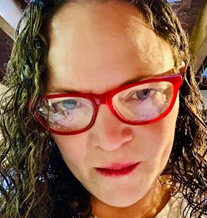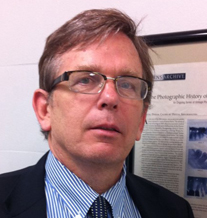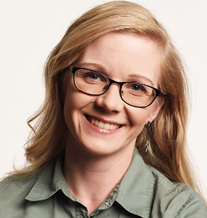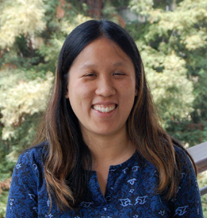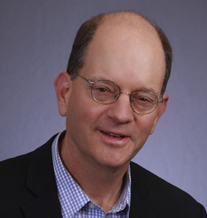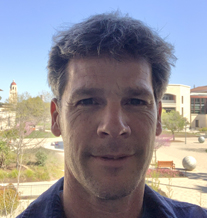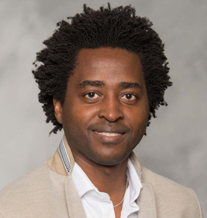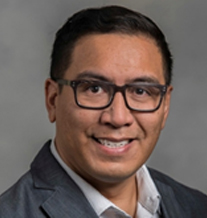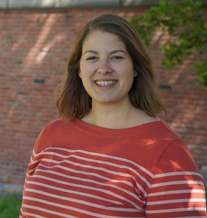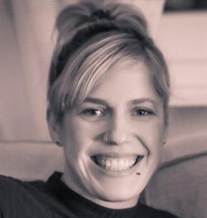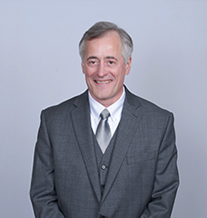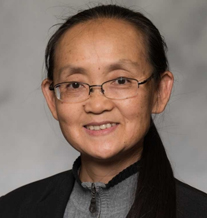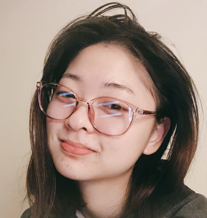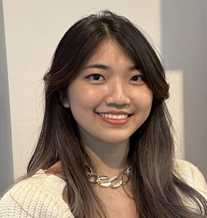GROUP
Prof. Annelise E. Barron, Principal Investigator |
Dr. Barron was trained as a chemical engineer at the University of Washington (B.S.) and U.C. Berkeley (Ph.D., under the mentorship of Prof. Harvey W. Blanch), and was a Pharmaceutical Chemistry postdoc with Prof. Ken A. Dill (UCSF) and Dr. Ronald N. Zuckermann (Chiron Corp.). She has served on the faculty at Stanford since 2007, and prior to that, served on the Chemical & Biological Engineering faculty of Northwestern University in Evanston, IL for 10 years (1997-2007). Dr. Barron has been awarded the NIH Pioneer Award (2020), the Presidential Early Career Award for Scientists & Engineers (PECASE) through NIH / NHGRI (1999), the Beckman Young Investigator Award (1999), and the Camille Dreyfus Teacher-Scholar Award (1998), among other awards. Dr. Barron was the youngest scientist ever to serve on the Scientific Advisory Committee to the Director of the NIH, under Dr. Elias Zerhouni. She has more than 180 publications and a current H-index of 52 (Web of Science, All Databases), and serves on the advisory boards of several biotechnology companies. She is proud to be 1/4 Quechua (the Native American people of Bolivia), 1/4 Hispanic, 1/4 Swedish, 1/4 English, and 100% American. | |||
Dr. Stephen S. Dominy, M.D., staff scientist and research director |
In 2022, Stephen S. Dominy, M.D., joined the Barron Lab as a staff scientist and research director with a focus on 1) the role of P. gingivalis and gingipains in neurodegenerative disorders such as AD, Parkinson’s disease, and Down syndrome with dementia, 2) understating the role of P. gingivalis and gingipains in various cancers, including glioblastoma, and 3) how gingipain degradation of LL-37 may lead to widespread immune dysfunction that often accompanies cancers and neurodegenerative disorders. Long term, Dr. Dominy seeks to continue the development of novel therapeutics, including peptoids, against P. gingivalis and its gingipain virulence factors, with the goal of improving the quality of life for patients with P. gingivalis-related diseases. Dr Dominy is the cofounder and former CSO of Cortexyme, a biopharmaceutical company that developed orally bioavailable, small-molecule inhibitors of gingipains from P. gingivalis for the treatment of Alzheimer’s disease (AD), based on his previous research results. Dr. Dominy received his bachelor’s degree in pharmacy from The Ohio State University, his medical degree from Wright State University in Ohio, and completed his psychiatry residency at the University of California, San Francisco. | |||
Dr. Olga V. Sazonova, Staff Scientist and Research Director |
Dr. Sazonova is a highly accomplished scientific leader with over 13 years of experience in computational methods and machine learning for biomedical research. Most recently serving as the Director of Data Science and Analytics at Nutrisense, she led R&D to study the impact of digital wellness programs on glycemic control in healthy and prediabetic populations. With expertise spanning computational biology, statistical modeling, and machine learning, Dr. Sazonova has held key roles at GRAIL Inc. and 23andMe. She has published and presented numerous studies in computational biology, supervised research scientists, managed collaborations, and served as the Principal Investigator on IRB-approved research studies. Dr. Sazonova holds a Ph.D. in Biomedical Engineering from Boston University and a B.S. in Biomedical Engineering from Northwestern University. In the Barron lab, Olga is spearheading human studies which leverage biosensors and wearables to elucidate causal relationships between glycemic control and cognitive function. Outside of professional interests, Olga is an avid reader of speculative fiction, an amateur musician, and serves as a Board member of CCSC, the largest child-care cooperative in California. | |||
Dr. Jennifer Lin, Research Engineer |
Jennifer received her B.S. in Chemical Engineering from Cornell University and Ph.D. in Chemical Engineering from Northwestern University. She is the current lab manager for the Barron lab and has experience in molecular biology and analytical chemistry. Her main research interests are developing antimicrobial peptoids as a topical treatment for chronic suppurative otitis media (CSOM), a collaborative project with the Santa Maria lab in the Department of Otolaryngology (OHNS), and investigating cathelicidin upregulation as a safe, effective therapy to prevent and/or treat Alzheimer’s disease. |
|||
Dr. Mark Ryder, Staff Scientist |
Dr. Mark Ryder is currently Professor Emeritus and Interim Chair of the Division of Periodontology and former Division Chair and Director of the Postgraduate Program in Periodontology at the University of California, San Francisco, where he has been a member of the faculty for the past 45 years.
He received his dental and specialty training from the Harvard School of Dental Medicine. He is the author of over 210 articles, abstracts, and book chapters, and has lectured extensively on a variety of research and educational topics. His current research interests include connections between periodontal diseases and Alzheimer’s Disease, the links between oral and systemic health in HIV patients, and basic and clinical trials on novel periodontal diagnostic and therapeutic approaches. |
|||
Dr. Florian Ermini, Staff Scientist |
Florian Ermini, Ph.D., is an accomplished biomedical research scientist with over 15 years of experience leading drug discovery programs across multiple therapeutic areas including neurodegeneration, metabolic disease, inflammatory conditions, and infectious disease. He has extensive expertise developing and leveraging in vivo pharmacology models, as well as advanced microscopy and molecular biology techniques for drug development applications. Dr. Ermini has made significant contributions to the field of neurodegenerative disease research, uncovering novel mechanisms of pathogenesis and evaluating potential therapeutics. His work on the role of Porphyromonas gingivalis infection in Alzheimer's disease has been published in high-impact journals and has advanced to clinical trials. Dr. Ermini joined the Barron lab as a Staff Scientist to further advance antimicrobial therapies against chronic bacterial infections in age-related diseases. He previously held leadership roles at biotechnology companies including Cortexyme, Inc. and Coyote Pharmaceuticals. Dr. Ermini earned his Ph.D. in Neuroscience from the University of Basel and completed postdoctoral training at Stanford University. He is an inventor on multiple issued patents and has authored over 25 peer-reviewed publications and abstracts. | |||
Dr. Laurent Bekale, Research Scientist |
Laurent Adonis Bekale, PhD, is a Research Scientist specializing in Biophysical Chemistry and Nanomedicine. He obtained his PhD degree in Biophysics and Cell Biology from the University of Québec à Trois-Rivières.
After his PhD, he was a Research Fellow in the Nanomedicine & Nanorobotics Laboratory at the National University of Singapore, before joining the Santa Maria Lab at the School of Medicine, Stanford. In 2024, Laurent officially joined the Barron Lab, where his research primarily involves synthesizing nanovectors to address various aging-related pathological conditions and combat bacterial biofilms in chronic infections. He has also been involved in investigating the underlying mechanism of antimicrobial peptoids. |
|||
Dr. Erwin Defensor, Staff Scientist |
Erwin received a PhD with concentration in Behavioral Neuroscience from the University of Hawaii and a BS in Neuroscience from UC Riverside. He completed postdoctoral fellowship research training in the Department of Neurosurgery at Stanford School of Medicine.
He is an in vivo pharmacologist with interest in therapeutic approaches for neurodevelopmental and neurodegenerative disorders, as well as brain injury and addiction. He has academic and industry experience in study/program management and has conducted projects across various therapeutic areas with leading pharmaceutical companies and early-stage biotechs. Erwin holds additional expertise in scientific product and applications for emerging in vivo technologies. He promotes the advancement of automated methods for generating digital biomarkers to accelerate the preclinical discovery pipeline. |
|||
Dr. Josefine Eilsø Nielsen, Postdoctoral Research Fellow |
Josefine has a MSc in Pharmacy, and a PhD in biophysical chemistry from the University of Oslo. In her PhD she studied the effect of antimicrobial peptides (AMPs) on the structure and dynamics of lipid membrane systems using small angle X-ray and neutron scattering as well as neutron reflectivity methodology.
Currently, Josefine holds the Novo Nordisk Foundation Stanford Bio-X fellowship, and is affiliated both with Prof. Annelise Barron at Stanford University and Prof. Håvard Jenssen at Roskilde University. Her current project focuses on investigating self-assembly and complexation properties of peptoids and peptides, interesting both for their antimicrobial activity as well as a potential key to understanding pathogenesis of Alzheimer’s disease and Type 2 Diabetes. |
|||
Dr. Claudia Zielke, Postdoctoral Research Fellow |
Claudi is an Analytical Chemist with education at the university level from the Universität Basel, Switzerland, Freie Universität Berlin, Germany, and Lunds Universitet, Sweden. Her main interest of research is investigating different kinds of biological compounds such as carbohydrates, peptides or nucleic acids on a molecular level using Separation Sciences and Light Scattering techniques. She was an Inclusive Excellence Postdoctoral Fellow at Santa Clara University, CA, before she joined the Barron Lab in February 2022. The focus of her current research is on the molecular interactions of LL-37 with different biomolecules. | |||
John A. Fortkort, Staff Scientist |
John is a registered patent attorney with almost three decades of experience. He has worked at various law firms, and served for 5 years as corporate in-house counsel for 3M. A chemist and mathematician by training, John has done extensive patent work worked in a wide variety of technical fields. He is a prolific inventor and has cofounded several startups. His research in the Barron lab is currently focused on photobiomodulation, antimicrobial and antiviral peptoids, and upregulation of cathelicidin gene CAMP expression. | |||
Kristian Sørensen, Life Science Research Professional |
Kristian graduated with a BSc and MSc in molecular biology and chemistry from Roskilde University. Before coming to the Barron lab in 2023, he studied and worked under Dr. Jenssen in Denmark where he synthesized and purified peptidomimetics and tested their antibacterial activity.
His interest will continue working on the synthesis of peptoids and improving upon spectroscopy, microbiological, and mammalian culture methods. |
|||
Sopida Pimcharoen – Ph.D. student |
Sopida graduated with a B.S. in Biology and Biomedical Engineering (minor) from Pennsylvania State University. Currently, she is a rotating PhD student in the Barron Lab. Prior to joining the Barron Lab, her research focused on developing self-assembling therapeutic peptide materials for drug delivery. Her current project focuses on studying the self-assembling interaction between LL-37 peptide with DNA and its potential applications. | |||
Jing Chen, Life Science Research Professional II |
Jing graduated with a BSc in public health in China and a MSc in Toxicology from the University of Montreal, Canada. Before joining the Barron lab, she had worked as a lab manager and research associate in the field of diabetic complication under Dr. Cai at the University of Louisville, Kentucky, and in 2017, she joined Dr. Santa Maria’s lab in OHNS here at Stanford University.
She mainly focused on projects involving the development of new small molecule therapies for oral mucositis and the treatment of CSOM related biofilms using metal nanoclusters. In the Barron lab, she conducts in vitro and in vivo research on projects related to the group’s research interests. |
|||
JJ Yin, Master student |
JJ Yin received her a B.S. in Biochemistry from the University of Oregon and is currently a master student in Bioengineering at Stanford university.
She is very interested in Cryo-ET, virology, innate immunity and the interdisciplinary field among them. JJ is working with Professor Wah Chiu and Professor Annelise Barron on understanding the effect of synthetic peptoids, natural peptide LL-37 and peptide complexes of LL-37 and Abeta40 on a variety of synthetic vesicles and viruses. |
|||
Zin Mie Mie Tun – Research Assistant |
Zin Mie Mie Tun was born and raised in Myanmar. She is a second-year student at City College of San Francisco majoring in Biology, and is working as research assistant with Dr. Laurent Bekale from the Santa Maria lab on discovering mechanisms of TM peptoids. Her research interests are microbiology, cell biology and cancer biology. | |||
Ella Moore, Research Assistant |
Ella is a second-year undergraduate at Stanford University majoring in Biomedical Computation. Previously, Ella worked in the Sharaf Lab on a project investigating the thermostability of lipoproteins. Prior to that, she worked as a summer analyst at Insight Partners on their Bio Investments team. Ella is interested in all aspects of neuroscience, especially its intersection with immunology. In the Barron Lab, Ella is working with Dr. Stephen Dominy to better understand the pathogenesis of Glioblastoma multiforme (GBM). |
|||
Research Collaborators |
||||
|
||||
Webmaster: Martin Tornil - Email: mtornil9@gmail.com - Portfolio: www.martytornil.com
